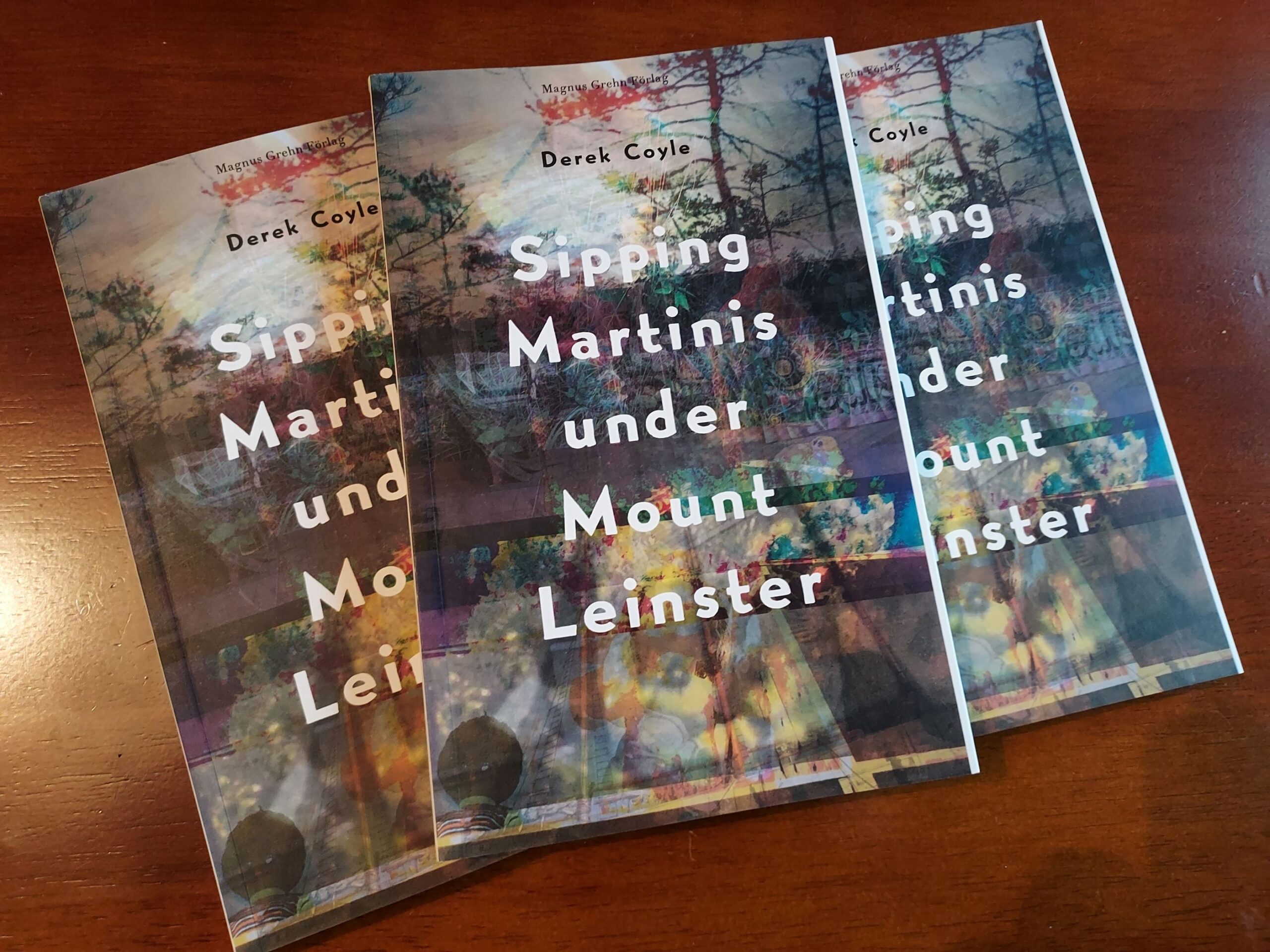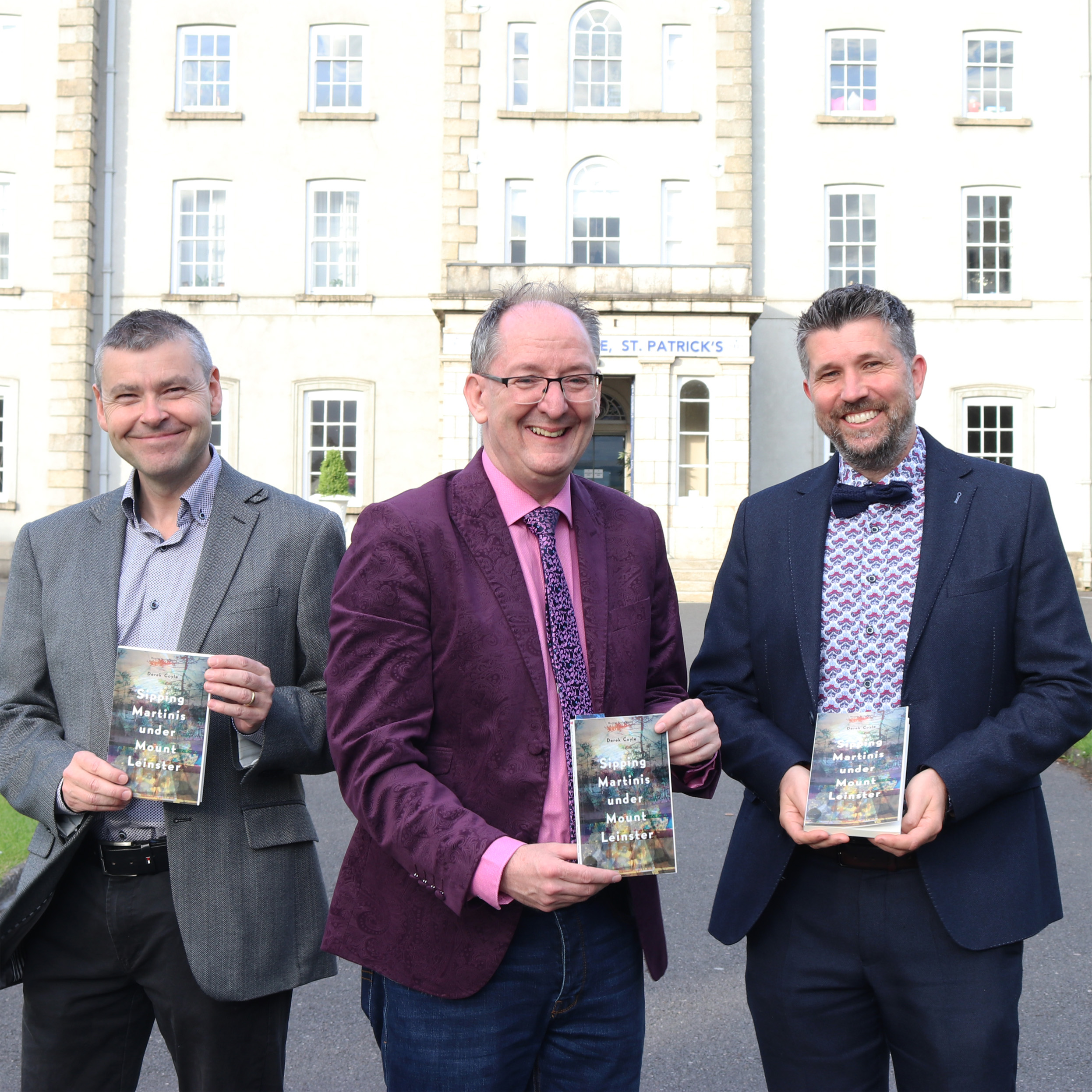Carlow College Lecturer in English & Creative Writing, Derek Coyle has launched his second poetry collection, Sipping Martinis under Mount Leinster (Tranås, Sweden: Magnus Grehn Förlag, 2024), in a dual language edition in English and Swedish. The Swedish translations are by poet Peter Nyberg Mollung.
The new collection is set to be launched at Carlow College, St. Patrick’s at a special event on Tuesday, 28th May at 7.30pm. The event will be opened by Carlow College Vice President, Dr Eric Derr and the collection to be officially launched by poet, Darren Donohue. All are welcome to attend – please register to attend here.
As the title poem suggests, much of the collection is firmly rooted in Coyle’s vision of County Carlow and its surrounds. Yet, from this location the poems roam far and wide and wild, with references to many authors, artists, and musicians, living and dead. Indeed, in the title poem many distinguished artistic luminaries turn up to sip martinis at a party that is something of a folk legend by now in the foothills of Mount Leinster. American poets, James Tate, Frank O’Hara, James Schuyler, rub shoulders with Irish poets like Medbh McGuckian, the German surrealist artist Franz Marc, and classical composer Ludwig Van Beethoven who, as it happens, is playing ‘The Irish Rover’ on fiddle to entertain the guests. As such, this poem stands as a very original homage to the poet’s influences.
Many poems deal with the recent Covid pandemic, particularly its impact on domestic relationships. Another poem ‘The Manueline Style’ references earlier pandemics, cholera, and dysentery, in its consideration of the historical court of King Manuel of Portugal. While that court indulged itself in conspicuous consumption and spectacle, silent killers set about stalking the land. This poem might well be a parable about contemporary capitalism in the West.

But this is not to say that the collection’s tone is in any way one of doom and gloom, or always covertly political. The collection contains many upbeat and amusing reflections on such ordinary everyday experiences as observing dandelions (in ‘Dandelion’) and hesitating to mow them due to their dazzling beautiful gold or consuming the perfect cup of tea (in ‘Tea’). There are a couple of poems that engage the Irish language poetic tradition with the Spanish poetry of Latin America, where Dáibhí Ó Bruadair and Aodhagán Ó Rathaille are brought into imaginative dialogue with Pablo Neruda and César Vallejo. Which is to say that these poems are dynamic, lively, and ambitious in their reach.
At the heart of this collection are many love poems, poems of intimacy and human connection and tenderness. ‘Carlow Poem #81’ is a testament to poetry’s attempt to say the unsayable as the poet, in an elevated language of mystery and strangeness, pays homage to the intensity of new love. ‘Carlow Poem #73’ explores that zone of fragility and uncertainty that attends the beginnings of a new relationship. ‘Carlow Poem # 67’, in wonderfully grand and lyrical language, celebrates the joy of a kiss.
‘The Boss’ offers a witty and insightful encounter with Bruce Springsteen in an obscure B & B in County Mayo, where over an Irish breakfast, some understanding is given as to the inspiration for Springsteen’s classic song ‘The River’. ‘The Magicians’ celebrates the magic of poetry itself to conjure new visions of reality before our eyes, an aspect of poetry celebrated in perhaps the most ambitious poem of the collection ‘Carlow Poem #15’. This poem opens an extensive vista, taking in such figures of classical history as Julius Caesar and Cleopatra, artists like Van Gogh and Beethoven, to poets Cavafy, Hikmet, and Shakespeare. Despite its breath of learned reference, this poem remains light and fresh and lyrical as it swiftly moves along in its own free form. There is the eco concern of ‘Carlow Poem #69’, a witty dialogue with the closing pages of James Joyce’s Ulysses, only set in rural Carlow in the village and town of Fenagh and Borris respectively, both nestled in the foothills of Mount Leinster. This poem is emblematic of the collection as a whole: local but with an eye fixed on the wider world, witty but urgent, humourous but serious, playful, and exact.
Derek Coyle’s Sipping Martinis under Mount Leinster is lyrical and playful, serious, and ambitious, in poems that are original and distinctive, poems that keep us on our toes with their unusual twists and turns, their unpredictable trajectories, and the striking corners of thought they take us to. You can order the book from Magnus Grehn Förlag at: https://magnusgrehnforlag.se/, or by emailing: mgrehn@hotmail.com.


